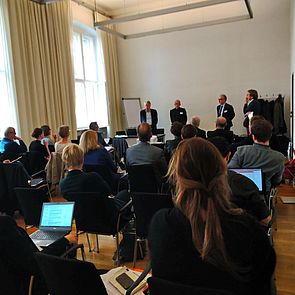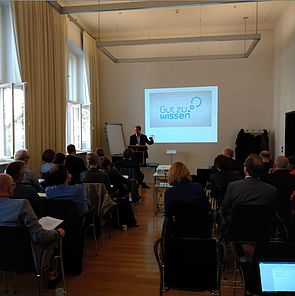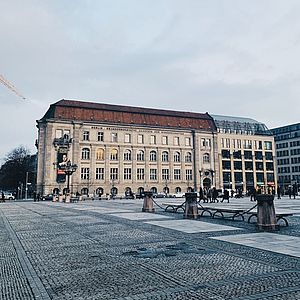
The Interdisciplinary research group is committed to constant exchange with experts from academia and from practice and to exchange with the broader public. This exchange is ensured through expert hearings and public academy lectures.
Subsequently we would like to give you a few impressions of the past events.
Online-Workshop: Science communication in times of the COVID-19 pandemiec – news media, social media and the role of misinformation
6th December 2021 | 4-7 p.m.
When the COVID-19 pandemic started in early 2020 researchers all over the world soon realized that it presented particular challenges for science communication but also rare opportunities to study what has worked, what failed, which mistakes were made?
Of particular concern was the concurrence of the immediate threat to everyone’s health to which governments responded with harsh restrictive measures and the surge of communication, reporting and commenting on the medical scientists’ dealing with the pandemic, the reliability of their diagnoses, their advice to governments, and the spread of misinformation by the social media feeding public protests.
The researchers appearing in the workshop, all of them established experts in science communication, have carried out studies in Europe, the US and South Africa looking at the early responses to the pandemic. Thus, they give a rare view of the challenges to science communication in an extreme situation.
You can get an insight into the program here.
Academy Lecture: Digital Science communication – Opportunities and risks of the communication of knowledge
7th October | 21st October (rescheduled to 28th October) | 4th November 2021 | 6 p.m.
Academy building at Gendarmenmarkt, Einstein-Saal, Jägerstraße 22/23, 10117 Berlin
Scientific evidence is an important factor for political and social decision-making. While in the pre-digital era scientific journalism and science itself were the mediators of these findings, communication has changed fundamentally with the change in media. Today, a variety of actors with a wide range of interests are involved in public communication about scientific topics. Thanks to the possibilities of digitalization, numerous sources of information and communication platforms are also available to lay persons. These developments certainly offer opportunities in terms of a politically and socially desirable democratization of science communication. However, there are also risks for the objective and credible communication of knowledge to the public. The academy lecture deals with these developments and their implications from different disciplinary perspectives.
Thursday, 7th October 2021 | 6 p.m. (live)
Between scientism and science skepticism – challenges for science communication in the digital world
Speakers: Peter Weingart (Academy member and speaker of the Interdisciplinary Working Group), Christoph Neuberger (Weizenbaum Institute and FU Berlin), Elisabeth Hoffmann (TU Braunschweig), Holger Wormer (TU Dortmund), Jan-Hendrik Passoth (European University Viadrina Frankfurt (Oder)).
Thursday, 28th October 2021 | 6 p.m. (Webinar)
The Race between Science and Pseudoscience in the Digital World from the Perspective of Cognitive Psychology
Speaker: Stephan Lewandowsky (University of Bristol)
Thursday, 4th November 2021 | 6 p.m. (Webinar)
Securing facts instead of fake news? What is the potential of social media regulation for science communication?
Speaker: Natali Helberger (University of Amsterdam)
You can get an insight into the program (only german) here.
Expert hearing on "Regulatory, economic and technical framework for science communication in a digital media environment" (Webinar)
16th November | 7th December 2020 | 18th January 2021
The establishment of new intermediaries and platforms can be seen as a process of fundamental institutionalization that profoundly changes the social mediation structure of nation states: Based on a global network, new exchange and transaction, processes are made possible. This process of change also has an impact on the mediation and use of scientific topics. The planned interdisciplinary exchange with experts from the disciplines of law, technology, media and economics will deal with the above-mentioned institutionalization process and its consequences for the social mediation system, with special emphasis on science communication.
Expert hearing on "Science communication infrastructures: Platforms, intermediaries and the need for alternatives" (Webinar)
15th June | 13th July | 14th September 2020
In this three-part series, the experts dealt with the changed socio-technical infrastructures of science communication. Here, the different platform and multi-platform strategies of communicators, those who are responsible for the technological development of large platforms and the possibilities as well as limitations of alternive platforms were analyzed.
Expert hearing on "Understanding of quality standards of non-professional agents communicating scientific related topics in digital communication" (live)
3rd March 2020
The expert hearing focused on non-professional agents communicating scientific related topics on Social Media. Participants were dealing with standards of quality and their importance for alternative agents as well as their impact on public scientific communication.
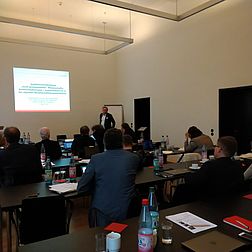
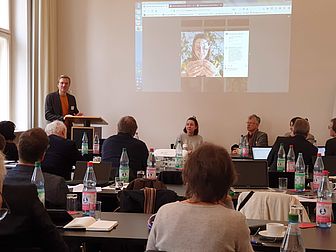
Expert hearing in cooperation with acatech on "Quality standards of institutional scientific communication in context of digitalisation" (live)
6th December 2019
The second expert hearing took place at Deutsche Akademie der Technikwissenschaften (acatech). Scientists and experts have been invited to discuss about the progression und quality of institutional scientific communication.
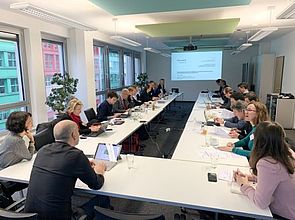
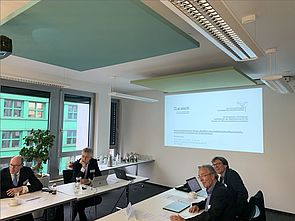
Expert hearing on "Securing the future of journalism on topics from science, technology and medicine: identification of current deficits & opportunities for targeted funding" (live)
18th October 2019
In this expert hearing, the focus of the exchange was about securing the future of journalism. Scientists from the fields of journalism and science communication were invited.
